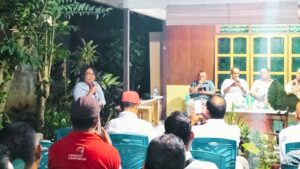Kalis Mardiasih really felt the adverse effects of digital attacks against critical groups, such as activists, journalists, and civil society organizations over the past two to three years, on her. “I get asked a lot, how come Kalis has less voice on Twitter now? Indeed, I haven’t tweeted much since the Ravio and Ananda cases,” she said in a discussion titled Democracy Under the Threat of Disinformation Ahead of the Election on Friday, February 10, 2023 at the German Cultural Institute, Goethe Institute, Jakarta.
At that time, in late September 2019, musician Ananda Badudu was arrested by the police. Ananda’s arrest was related to money raised through the crowdfunding website kitabisa.com. The fund was channeled to student demonstrations against the revised Criminal Code Bill (RKUHP) and the revised Law on Corruption Eradication Commission (UU KPK) in front of the parliamentary building on September 24-25, 2019. Meanwhile, Ravio was arrested at Jalan Gelora, Menteng, Central Jakarta in April 2020. He was charged with the Electronic Information and Transaction Law (ITE) because he claimed to have committed hate speech.
“I am not lying. Every time an act of digital authoritarianism happens, I always get that psychosomatic feeling,” said Kalis, who is also a digital literacy activist.
Referring to SafeNET data, digital security incidents occurred 302 times throughout 2022. This security incident increased by 54 percent compared to the previous year, which was 193 incidents. Of that number, around 50 journalists or media workers became the victims. This number is the third largest after activists or civil society organizations.
In September 2022, a massive attack happened on Mata Najwa’s Twitter account, journalists, media staff, and former Narasi TV staff. At least 30 workers were attacked, including the editor-in-chief, producers, reporters, designers, and human resources staff. They experienced Whatsapp, Telegram, Facebook, and Instagram hacks.
Kalis herself currently admits that she feels uneasy when she is doing activities on social media. She is no longer free to express her opinions. She feels jittered especially when one of her acquaintances in the government informed her that her tweets on Twitter had begun to be used as counter-attack evidence. Therefore, she stated that she often brakes the desire to comment in cyberspace. “So I just shitpost every day..[about] chili condiment, fried tempeh, missing my husband. Nothing important,” she said. Even so, “I still take alternative steps. Looking for strategic issues that I can still talk about. I have enough mental capacity to respond to situations of democratic crisis, especially digital democracy,” she continued.
This condition is also worried by the Deputy Director of the Indonesian Media Development Association (PPMN), Fransisca Ria Susanti. Digital attacks and hoax labeling, according to her, can be a weapon to silence civil society groups that are critical of the government. This also applies to journalists. As a result, critical groups choose to self-censor. “If this happens, democracy will be difficult to obtain,” she said.
Previously, Freedom House – an institution in the United States that often measures a country’s democracy index, determined Indonesia’s democratic status as “partly free”, or not fully democratic. Indonesia’s democracy score has regressed from 65 in 2013 to 59 in 2022. Meanwhile, The Economist Intelligence Unit (EIU) report in early February 2023 showed that Indonesia’s democracy index was below Colombia and the Philippines.
Therefore, the Executive Director of Amnesty International Indonesia, Usman Hamid, believes that digital attacks and disinformation cannot be underestimated. Almost all countries experience the same thing, especially in times leading up to the general elections. In the case of elections in the Philippines, for example, where citizens were misled before voting. This is what benefited Ferdinand Marcos Junior to run smoothly even though he came from a dictatorial family. “Misinformation that eventually led the Filipino people astray. Meta Facebook has closed around 400 accounts that are considered crimes,” Usman said on Friday, February 10, 2023.
Not only in Indonesia
Digital attacks and the proliferation of hoaxes, said Usman, occur in other Southeast Asian countries, including Myanmar. Civil liberties in the neighboring country have deteriorated since 2020 after the election-winning government of Aung San Suu Kyi’s National League for Democracy (NLD) party was overthrown by the military. Amnesty International in November 2022 launched at least 1.4 million people displaced and no less than 12,800 detained since the military took power.
“There is a tendency for democracy in Indonesia to regress, although not as drastic as the military coups in Thailand, Myanmar and Turkey. Even so, democracy in Indonesia is quite dangerous because civil space is shrinking,” he added.
One of the consequences of the shrinking civic space, according to Usman, is the attack on the integrity of the election organizers. The General Election Commission (KPU) is accused of having intervened in the results of factual verification of political parties ahead of the 2024 General Election. “So if civil space narrows, if the space for political opposition weakens, if electoral electability is also destroyed, then Indonesia is actually not a democratic country,” he said.
In Timor Leste, hoaxes ahead of the election began to appear as well, although not rampant. “Because internet users in Timor Leste are not so high, the hoaxes are only circulating in Dili. And it just becomes a laughing stock,” said the Executive Director of Centro Nacional Chega! Hugo Fernandes.
One of the hoaxes that spread ahead of the Parliamentary Elections on May 21, 2023, was information about the CNRT Party’s version of the cabinet formation. The information was created in a file with the CNRT logo on it. But, according to Fernandes, it was dubious because the list of names of prospective ministers who sit in the cabinet are figures who have been known in the past as pro-autonomy figures in Indonesia. In fact, the CNRT, founded and led by Xanana Gusmao, was known from the beginning as a pro-independence movement. “This is clearly a hoax, launched by a counterparty and spread on social media,” Fernandes told Jaring.id on Friday, February 17, 2023.
Ironically, he said, journalists affiliated with the party actually helped produce and spread fake news through Facebook – the social media with the most users in Timor Leste.
The “CNRT Cabinet” hoax, according to Fernandes, is the most popular political hoax to emerge ahead of the upcoming elections. However, he believes that the election will not significantly change the political map of the parliament. The two major parties, CNRT and Fretilin, are predicted to continue to control parliamentary seats. Even so, he agrees that the spread of hoaxes should be eradicated. Unfortunately, regulations that address the spread of hoaxes do not yet exist. “Last year, there was a discussion (in the parliament) about defamation law and then cyber law. However, this was later canceled because many people opposed it,” he said.
Meanwhile, the Broadcasting Bill, which has been discussed in parliament since last year, has also not been finalized. One of the articles in this law gives additional authority to the Press Council to monitor broadcasting content. This could be useful to anticipate the spread of hoaxes on radio and television – the media most accessed by Timorese citizens. However, he said, passing this law was not an easy task. “The majority of radio and television owners in Timor Leste are also political party leaders,” Fernandes said.
Civic Space Must Be Strengthened
Political observer from the Department of Politics and Social Change, Australian National University, Edward Aspinall revealed that democracy in Indonesia is beginning to show signs of regression. “Even though the regression in Indonesia is not as brutal as Myanmar and Thailand. In Indonesia, it is more slowly. Gradually. I think the process is quite clear,” Aspinall said when expressing his views in a discussion session organized by PPMN, Friday, February 10, 2023.
These signs, according to him, have begun to be detected since the era of President Susilo Bambang Yudhoyono’s administration. The conditions worsened when President Joko Widodo took office 8 years ago. “Civil liberties began to be undermined 8-10 years ago,” he said.
One indication of regression revealed by Aspinall is the dissolution and prohibition of community organizations in 2020 through Government Regulation in Lieu of Law (Perppu) Number 2 of 2017 concerning Amendments to the Community Organization Law Number 17 of 2013. The issuance of this Perppu has implications for simplifying the process of applying administrative sanctions to mass organizations that commit violations. “In addition, the government’s reaction to student democracy during the ratification of the Criminal Code and the Omnibus Law on Job Creation,” he said, referring to the attitude of the House of Representatives and the government which defied the Constitutional Court’s decision regarding the Job Creation Law.
Previously, the government issued a regulation in lieu of the Job Creation Law at the end of last year to replace the Job Creation Law, which was declared conditionally unconstitutional by the Constitutional Court. However, the Legislation Body of the House of Representatives and the Regional Representative Council together with the government agreed to bring the Perppu Number 2 of 2022 to the plenary session on February 15, 2023. Only the Democratic Party and the Prosperous Justice Party rejected the decision.
This elite consolidation, according to Aspinall, is the main problem in Indonesia. Opposition groups no longer have the power because the current government regime can intervene in political parties, election organizers, and even law enforcement. “That’s what’s more worrying these days. If that happens, it means that the process of democratic regression in Indonesia will enter a new phase,” he said.
“So this is a structural problem, because I am very sure that in general, the Indonesian people support democracy,” he continued.
The status quo of these elites then allows the practice of spreading fake news or hoaxes to be born, because hoaxes are useful for tricking the public into accepting the social, economic, and political conditions of a particular regime. “I think hoaxes play a role in preparing people to accept the democratic regression process. People don’t take a critical stance against hoaxes,” he lamented.
This condition can be seen from the polarization of society before and after the election. Where the community is divided into several groups. “Society is tolerant but anti-democratic towards opposing camps. The issue of ‘cebong and kampret’ I think is a factor. It must also be noted as a regression factor. Some people can be tolerant of anti-democratic actions as long as they are directed at certain political opponents,” he added.
Due to these conditions, Usman Hamid predicts that the previous election chaos, such as polarization and identity politics, will occur again in the upcoming 2024 elections. “It will still be rowdy. It happened in the 2014 general election, in 2018 during the Jakarta Gubernatorial Election, and it happened again in 2019 elections. It also happened in 2022 in the Philippines. It is not impossible to happen again in 2024,” he said.
In order not to go too far, Usman suggested that the community, politicians, and the government prioritize democracy and human rights over short-term political interests in the next election. The community is also asked not to be just spectators of the democratic party, but to be active subjects. For example, in rejecting discourses that lead to hyper-nationalism. “When we defend HTI, it was dissolved with a judicial process. That does not mean defending HTI. We are defending the democratic system. That’s what hasn’t been solved enough. So that is our homework to fix collective action so that it will not be repeated during the next election,” he said.
Usman and Aspinall agreed that the community needs to jointly fight identity politics and the spread of hoaxes ahead of the election. “If there are things that need to be questioned through online petitions, then start it. Raise support. Tell us why it’s important. I think there must be action,” said Usman.
One of the community groups that have moved to eradicate hoaxes is GERAK Aceh and the Maluku Community Development and Empowerment Foundation (YPPM). GERAK Aceh member Nurma revealed how identity politics in Aceh began to be blown up, both through Whatsapp Groups and religious pulpits. Among other things, about women who cannot become leaders.
“So it is necessary to provide understanding to the community. When women, youth, and people with disabilities receive information, they should not immediately accept it because most of those who receive hoaxes are women and young people who get them from WhatsApp Groups and Facebook. They simply accepted and immediately spread it without thinking clearly,” he said.
Therefore, the Aceh Ulama Consultative Assembly (MPU) reminded the public of the emergence of hoaxes, slander, and incitement in this political year. Therefore, MPU plans to re-socialize Fatwa Number 6 of 2018 concerning the Spread of Hoaxes and Their Impacts ahead of the election.
Chairman of MPU Aceh, Tgk. H. Faisal Ali said that his party has agreed with a number of institutions, such as Mafindo and GERAK to make the fatwa as a basis for preventing the spread of hoaxes. “MPU will also issue its own proselytization. Currently, MPU has issued a legal fatwa on the recruitment of election organizers and supervisors,” he said when interviewed in his office on Friday, February 24, 2023. “This is not only talking in a religious context, but also in the context of democracy. Democracy will not have quality if people vote or not based on hoaxes,” he added.
Meanwhile, the Maluku Community Development and Empowerment Foundation (YPPM) stated that it is still struggling with the issue of religious conflict. “It is a sensitive issue, especially when it comes to religion,” said a representative from YPPM, Roni.
In 2022, continued Roni, there was a conflict between residents due to land boundary issues. But because of hoaxes, the dispute went further to religious issues. “Someone sent information related to ‘Ambon burning’. In fact, the problem is only a land issue but then it is associated with religions,” he said.
From this point, YPPM tries to strengthen community efforts to counteract fake news involving schools, youth groups, and religious leaders. “…..especially those related to religious issues. Because the issue has torn apart the religious life of the people in Maluku,” he concluded.







